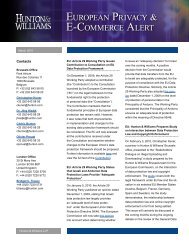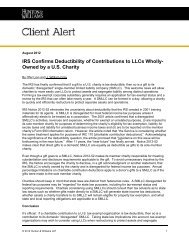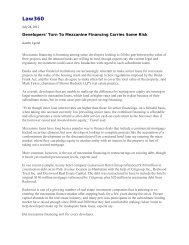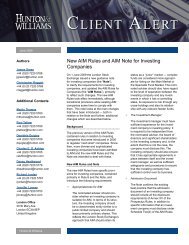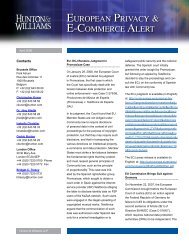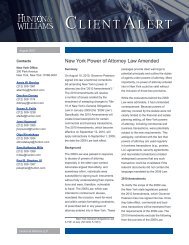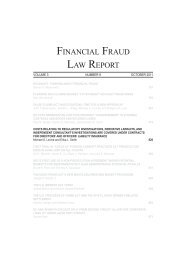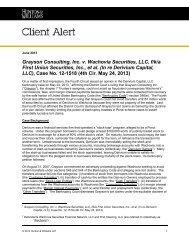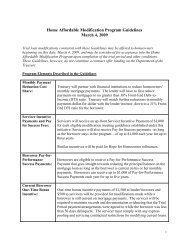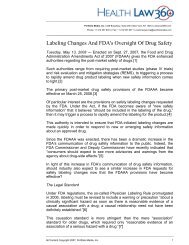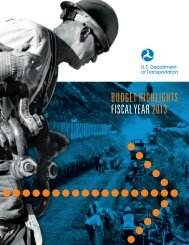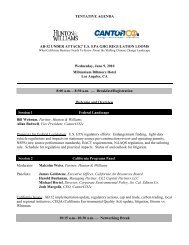Hunton & Williams Renewable Energy Quarterly, September 2009
Hunton & Williams Renewable Energy Quarterly, September 2009
Hunton & Williams Renewable Energy Quarterly, September 2009
Create successful ePaper yourself
Turn your PDF publications into a flip-book with our unique Google optimized e-Paper software.
<strong>Renewable</strong> <strong>Energy</strong> <strong>Quarterly</strong><br />
the effectivity of the RE Act), provided that the developers<br />
pass on the savings to end users in the form of lower rates;<br />
(6) For projects failing to receive an income tax holiday<br />
before full operations, accelerated depreciation at twice the<br />
normal rate;<br />
(7) Zero percent value-added tax on the sale of power or<br />
fuel from renewable sources; the purchase of local goods,<br />
properties and services for project development purposes;<br />
and payment for services in connection with the exploration<br />
and development of renewable sources;<br />
(8) Tax-free sale of carbon emission credits; and<br />
(9) Tax credit equivalent to 100 percent of the value-added<br />
tax and customs duties that would have been paid on<br />
machinery, equipment, materials and parts purchased locally<br />
had they been imported, provided that the purchase is made<br />
from a DOE-approved Philippine supplier.<br />
In addition to incentives offered to developers, the IRR<br />
goes on to detail incentives for manufacturers of renewable<br />
energy generation equipment and farmers who plant<br />
biomass resources, as well as incentives for end users to<br />
promote rural electrification and the use of net metering.<br />
Resource Development Contracts and Foreign Investor<br />
Limitation Controversy<br />
The IRR provides that all sources of potential energy are<br />
owned by the state and that each developer must enter<br />
into a <strong>Renewable</strong> <strong>Energy</strong> Service/Operating Contract (“RE<br />
Contract”) with the government (through the president or<br />
the DOE) under which the developer will have an exclusive<br />
right to explore and develop a particular area for a specified<br />
period. The RE Contract may have a term of up to 25 years<br />
(renewable for up to 25 years) and will cover two stages:<br />
pre-development (preliminary assessment and feasibility<br />
study up to financial close) and development (construction<br />
and installation of facilities up to operations). As consideration<br />
for granting the exclusive right to utilize Philippine<br />
natural resources to the developer, the government<br />
receives 1 percent (or 1.5 percent in case of geothermal RE<br />
Contracts) of the gross income received by developers attributable<br />
to sale of renewable energy. This “Government Share”<br />
is split, with 60 percent to go to the national government and<br />
40 percent to the local government. The Government Share<br />
is not collected for biomass projects or projects on a micro<br />
scale less than 100kW.<br />
The DOE has provided some further detail on RE Contracts<br />
in its circular titled Guidelines Governing a Transparent<br />
and Competitive System of Awarding <strong>Renewable</strong> <strong>Energy</strong><br />
Service/Operating Contracts and Providing for the<br />
Registration Process of <strong>Renewable</strong> <strong>Energy</strong> Developers (the<br />
“Guidelines”), issued on July 12, <strong>2009</strong>. Under the Guidelines,<br />
RE Contracts can be awarded by competitive bid or by direct<br />
negotiation or arrangements for existing projects can be converted<br />
to RE Contracts in order for the projects to avail of the<br />
incentives provided under the RE Act. Direct negotiation can<br />
only be used to award new RE Contracts if there is only one<br />
applicant for a project or for areas for which there is limited<br />
technical data (dubbed ‘Frontier Areas’).<br />
Under the IRR and the Philippine Constitution, RE Contracts<br />
may only be entered into by Filipino citizens or corporations<br />
or associations at least 60 percent of whose capital is<br />
owned by Filipinos, although a special exemption is made<br />
for large-scale geothermal contracts under the Guidelines.<br />
The Joint Foreign Chambers of Commerce in the Philippines<br />
have expressed disapproval at this limitation on foreign<br />
developer investment in wind, solar and ocean energy and<br />
have requested a review of the interpretation of the IRR and<br />
the Constitution on the grounds that this limitation seems<br />
to conflict with the policy objectives at the heart of the RE<br />
Act. 3 There is also some controversy as to whether allowing<br />
wholly foreign corporations to invest in geothermal projects<br />
under the Guidelines is in fact constitutional. 4<br />
Looking Forward<br />
As noted above, within the next year or so the rules and<br />
regulations outlined in the IRR will be formalized, concerns<br />
surrounding foreign investment will likely be addressed<br />
and the picture will become clearer for developers. The<br />
response from the private sector has already been positive;<br />
the Philippine Star reported on July 14, <strong>2009</strong>, that there are<br />
now over 100 renewable energy projects in the pipeline for<br />
investors influenced by the attractive incentives offered by<br />
the RE Act.<br />
Indonesia<br />
The government of geothermal resource-rich Indonesia has<br />
recently announced a second phase of its “crash program”<br />
3<br />
Ben Arnold O De Vera. “Equity Cap on <strong>Energy</strong> Projects Antiinvestor.”<br />
Manila Times. August 27, <strong>2009</strong>.<br />
4<br />
Myrna M. Velasco “Foreign Investors Bat for Clarity in<br />
Re-Classification of Geothermal as RE Resource.” Manila Bulletin.<br />
<strong>September</strong> 9, <strong>2009</strong>.<br />
11 <strong>Renewable</strong> <strong>Energy</strong> <strong>Quarterly</strong> www.hunton.com



